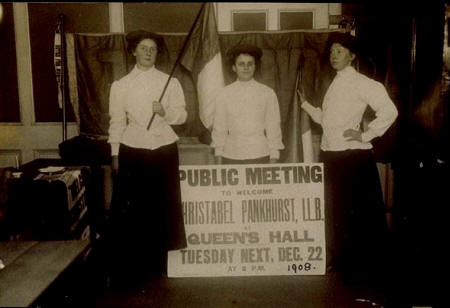

Queer Places:
(1909) 25 Bishop's Mansions, Fulham, London SW
(1928)
Adselt, The Ridgeway, Mill Hill, London NW7, UK
 Elsa
Gye (October 3, 1881 – December, 1943) was a music student at Guildhall who
became a suffragette and involved in disruptive events in London and Scotland
and was imprisoned for the cause of women's suffrage.[1]
Elsa
Gye (October 3, 1881 – December, 1943) was a music student at Guildhall who
became a suffragette and involved in disruptive events in London and Scotland
and was imprisoned for the cause of women's suffrage.[1]
Nina Boyle’s political and friendship network was far-reaching and on her death in 1943, a memorial fund was set up by her women colleagues specifically to keep alive the political issues that Nina Boyle fought for all her feminist career. The Nina Boyle Memorial Committee comprised Cicely Hamilton as chairwoman, Elsa Gye as honorary secretary and Marie Lawson, honorary treasurer. Members of Parliament who were also patrons to the Nina Boyle Memorial Fund included Eleanor Rathbone, Nancy Astor, Ellen Wilkinson, Irene Ward, Dr. Edith Summerskill and Megan Lloyd George.
Eleanor Rathbone, Nina Boyle, Marian Reeves, Elsa Gye, Winifred Holtby, Alison Neilans, Edith Craig, Sylvia Pankhurst, and Emmeline Pethick-Lawrence were among the feminists who shared membership in the Myra Sadd Brown Memorial Library, which suggests that these women held similar intellectual, political and literary interests.
Elsa Gye was the daughter of Edwin Fanning Gye (1845 - 1910) and Catherine Scott (1852 - 1944). Elsa was educated at Croydon High School and the Guildhall School of Music.
Gye was one of a large number of women who hid in furniture vehicles and rushed on Parliament on 11–13 February 1908, and was arrested and sentenced to six weeks in prison.[3] She had met 'Daisy' Bullock in 1907 and was with Gladice Keevil, Nellie Martel, Emmeline Pankhurst, Aeta Lamb when they disrupted Chancellor H. Asquith speaking at a meeting in Nottingham. In 1908, Gye worked with Minnie Baldock to open a local branch of Women's Social and Political Union (WSPU) in Nottingham. Daisy's brother William Ewart Bullock had studied chemistry in Nottingham and then was a medical student at Edinburgh, when he married Elsa Gye in 1911, whilst a student, with financial support or friends, including Elsa herself.[3] Her husband took her surname and became Dr W.E. Gye.
During Churchill's campaign for the by-election in 1908 in Dundee, after losing his seat in Peckham, Gye went with Rachel Barrett and Helen Fraser to over 200 meetings, spoke at factories and at the large Gaiety Theatre in Dundee, gathering crowds to hear them criticising the Prime Minister's dealings with women over the question of suffrage.
Gye was supportive to Constance Lytton during her first activism in 1909, recommending she should breach the peace to get herself arrested and make speeches to attract attention.[3] She was separated from Lytton in the crowd and the crush affected Lytton's weak heart. She was also one of the organisers with Gladys Keevil of noisy protests at Budget meetings at Bingley Hall, Birmingham on 17 September 1909 when firemen were on standby, and other women used slates thrown from a nearby roof to drown out Asquith's speech.[4]
The mother of fellow suffragette, Elsie Howey wrote to Gye in 1928 to complain about the effect of force feeding on her daughter's voice.[3]
After the passing of the Representation of the People Act 1918, in which some women within the United Kingdom were first given the right to vote, Elsa Gye's husband worked on cancer research with the Imperial Cancer Research Fund, and on infection in World War I.
Gye helped the creation of the Suffragette Record Room in London. She passed away on Dec 1943 in Hendon, Middlesex, England.
My published books: